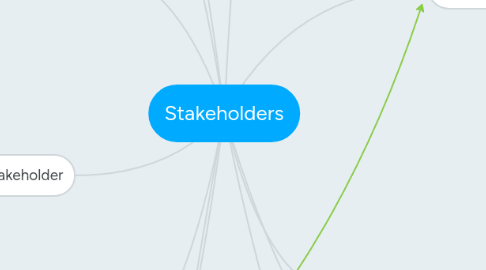
1. What is a stakeholder?
1.1. Anyone with a vested interest in the company or who is impacted by it
1.1.1. shareholders
1.1.2. wider community
1.1.3. local community
1.2. "any group or individual who can affect or is affected by the achievement of an organisation's purpose"
1.2.1. Friedman, 1984
1.2.1.1. Friedman's classic stakeholder theory explores business-society relationships for a strategic managerial purpose
1.2.2. back to what is an organisation's purpose?
2. Stakeholder models
2.1. Corporate stakeholder model
2.1.1. only a 2 way relationship
2.1.2. relationships can be
2.1.2.1. contractual
2.1.2.2. moral
2.1.2.3. legal
3. Principles of stakeholder management
3.1. 1. stakeholder enabling principle
3.2. 2. stakeholder fiduciary principle
3.3. 3. principle of stakeholder resouce
4. Types of stakeholder
4.1. Mitchell et al, 1997
4.2. 1. dormant
4.3. 2. discretionary
4.4. 3. dangerous
4.5. 4. dominant
4.6. 5. dependent
4.7. 6. definite
4.8. 7. demanding
5. Why manage stakeholders
5.1. they will influence a project
5.1.1. can affect the lifespan of a project
5.2. could help with future projects
5.3. being morally responsible is good
6. Stakeholder management process
6.1. 1. identify the legitimate stakeholders
6.2. 2. determine the interests of the stakeholders
6.3. 3. evaluate the type and level of stakeholder power
7. table linking sustainable development aims and stakeholder theory
8. Purpose of a business
8.1. "the business of business is business"
8.1.1. Friedman, 1970
8.2. "create and keep a customer"
8.2.1. Drucker, 1954
8.2.2. links to CRM
8.3. the fiduciary responsibility of management is to operate in the interest of the owners
8.3.1. think about how can do this
8.3.1.1. eg airlines
8.3.1.1.1. Ryanair all about cutting costs to make most money
8.3.1.1.2. Southwest about treating staff well so treat customers well so keep customers and make money that way
8.4. CSR is becoming big part of business now
8.4.1. morals
8.4.2. just PR
8.4.3. company image
9. Stakeholder perspecitves
9.1. 1. corporate centric
9.2. 2. stakeholder centric
9.3. 3. concept centric
10. Critiques of stakeholder management
10.1. purposeful management has a single-valued corporate objective
10.1.1. "multiple objectives is no objective"
10.1.1.1. Jenson, 2000
10.2. It isn't the businesses job to deal with the externalities
10.2.1. its the Government's responsibility to set framework in which businesses can operate to control externalities
11. a/ps have to have an a/p consultative committee
11.1. Civil Aviation Act, 1982
12. Freeman, 2013
12.1. Saying money is purpose
12.1.1. like saying i need red blood cells to survive so the purpose of life is making red blood cells
12.2. "business ethics" is a contradiction - like jumbo shrimp
12.3. people are not simple being of self interest
12.3.1. "The Great Jackass Fallacy"
12.3.1.1. Once you start treating people like jackasses they start nosing for the carrot and avoiding the stick

